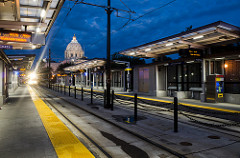
Matt Doll, Minnesota Environmental Partnership
When Governor Walz unveiled his two-year state budget proposal last month, it contained many good components, including new revenue to help address the budget shortfall. But let’s just say it was underwhelming on the climate front. While it’s understandably a difficult time for state budgets, the global climate crisis is not getting the action it needs here at the state level. At a time when Minnesota has just reported increasing – rather than reducing – levels of overall emissions – the need is nothing short of urgent. The budget included few measures that would reverse this trend, and some of them are of questionable climate benefit.
Perhaps the most noticeable omission was public transit improvements, for which no new dollars are included in this budget. Among MEP’s priorities for this year is passing a funding mechanism to build out and support a first-class Bus Rapid Transit and auxiliary transit system over the next 10 years. While Metro Transit and other agencies are continuing to move forward with some service expansions, the Walz budget doesn’t aim for where we need to go.
That’s a problem for Minnesotans, and a problem for our climate. Transportation is Minnesota’s largest contributor to climate change and a significant source of our air pollution, and most of the problem is commuter vehicles – cars, trucks, and SUVs. Even as electricity becomes cleaner, our vehicle fleet is continuing to drive emissions.
We can electrify our way out of part of this problem. MEP supports the Walz Administration’s work to implement the Clean Cars standards that more than a dozen other states have already established. Clean Cars would require dealerships to include zero-emissions models, so that Minnesotans will have more options to purchase vehicles that don’t add carbon pollution to the atmosphere. With GM’s announcement that all of its vehicles will be zero-emission by 2035, it’s clear that the tide is turning against fossil-fueled cars and trucks.
But even a Clean Cars standard and widespread adoption of clean vehicles can’t get us where we need to go on a fast enough timeline: we need to reduce vehicle miles traveled in cars and trucks. That means changes in land use and ambitiously adding to our transit fleet, not allowing it to stagnate.
We need to make sure that public transit is reliable, convenient, and comfortable for Minnesotans, so that it can provide a viable alternative to personal vehicle travel. Done right, transit can connect hundreds of thousands of people with job opportunities, services, and amenities. It can enhance environmental justice by serving disadvantaged communities and reducing air pollution by replacing car miles. And it has become clear that even as the COVID-19 pandemic continues (hopefully entering its final months), public transit is largely COVID-safe, possibly safer than rideshare services like Uber and Lyft.
The Walz Administration appears to be hoping for the federal government to fill in the gap when it comes to transit funding. It was encouraging to hear newly-confirmed Transportation Secretary Buttigieg say, “…roads aren’t only for vehicles…we gotta make sure that pedestrians and individuals and bicyclists and businesses can all coexist on the same roadway,” signalling a shift in transportation thinking at the federal government. But state funding is usually needed to unlock federal dollars for transit systems, and we can’t assume the availability of new funds that will fix all our problems.
We recognize that the final passage of a two-year budget will be a compromise process involving the Governor, the DFL-controlled House, and the Republican-controlled Senate. But having no new transit dollars in the Governor’s budget proposal does not put transit advocates in a strong position to push for the investments our state and planet need.
MEP will continue to advocate for transit improvements as part of our 2021 collaborative priorities. We hope that legislators will show much-needed leadership on this critical climate and environmental justice issue.